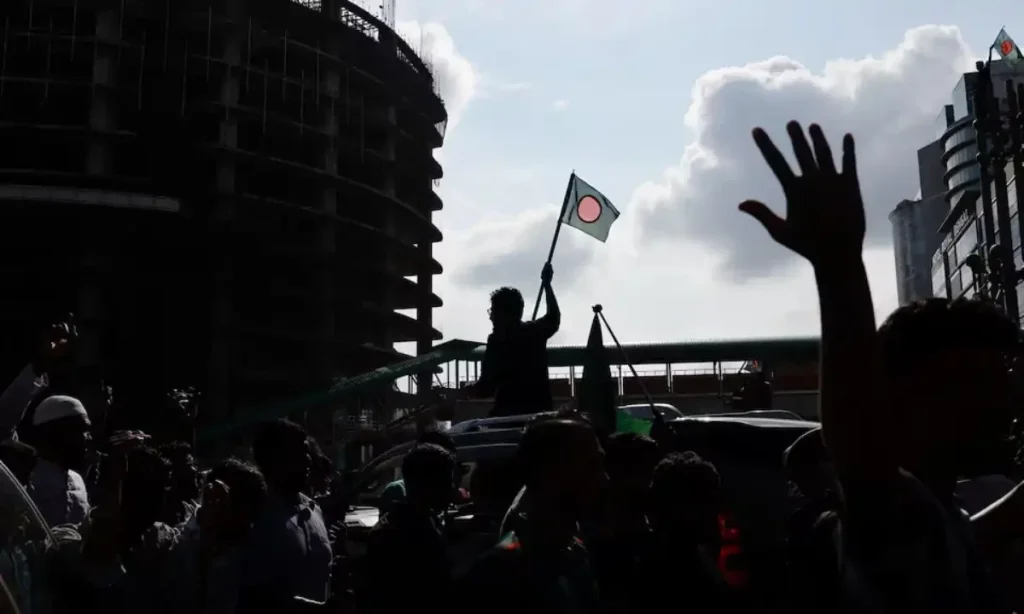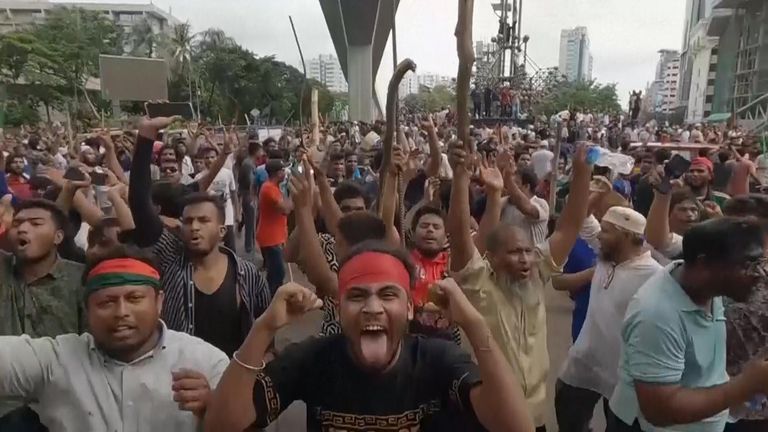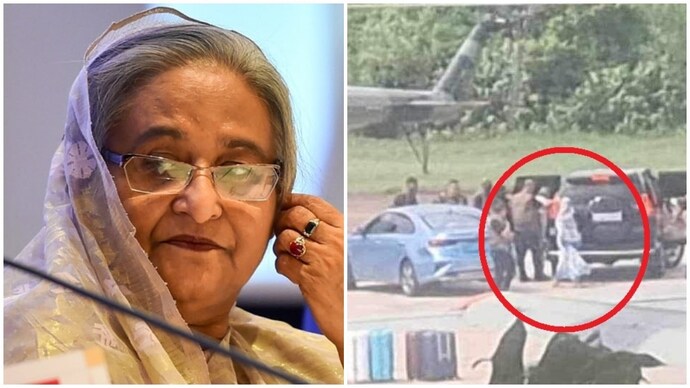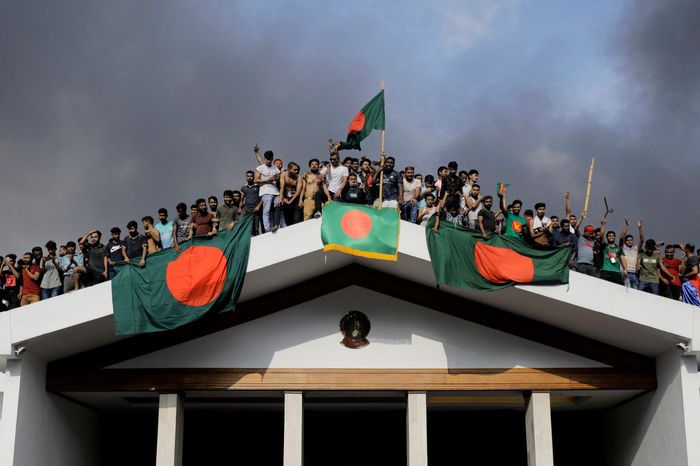In a shocking turn of events that has sent ripples through South Asia, Bangladesh Prime Minister Sheikh Hasina Flees has reportedly fled the country, leaving a power vacuum that the military has swiftly moved to fill. This unprecedented development has thrown the nation into turmoil, raising questions about the future of democracy in Bangladesh and its implications for regional stability. As the world watches, the Bangladesh Army has announced plans to form an interim government, marking a potential shift in the country’s political landscape.
The sudden departure of Sheikh Hasina, a dominant figure in Bangladeshi politics for decades, has left citizens and international observers alike scrambling for answers. How did this situation unfold so rapidly? What led to the Prime Minister’s flight? And perhaps most importantly, what does this mean for Bangladesh’s future?
This comprehensive analysis will delve into the events leading up to this crisis, examine the potential consequences, and explore what the future might hold for this strategically important South Asian nation.
The Unfolding Crisis: A Timeline of Events
To understand the gravity of the current situation, it’s crucial to look at the sequence of events that led to Prime Minister Sheikh Hasina’s sudden departure:
- Rising Tensions: In recent months, Bangladesh has been experiencing increased political unrest, with opposition parties accusing the government of authoritarianism and suppressing dissent.
- Economic Challenges: The country struggled with economic difficulties, including rising inflation and a foreign currency crunch, which fueled public discontent.
- Protests Escalate: Street demonstrations against the government intensified, with clashes between protesters and security forces becoming more frequent and violent.
- Political Crackdown: The government responded with a harsh crackdown on opposition leaders and activists, further polarizing the political landscape.
- Military Unrest: Reports of discontent within the military ranks began, with some factions expressing concern over the political situation.
- The Flight: In a move that surprised many, Prime Minister Sheikh Hasina reportedly left the country under darkness, with conflicting reports about her destination.
- Military Intervention: Within hours of the news breaking, the Bangladesh Army announced its intention to form an interim government to maintain stability.
The Reasons Behind Sheikh Hasina’s Departure
While the exact circumstances of Sheikh Hasina’s flight remain shrouded in mystery, several factors likely contributed to this drastic action:
- Security Threats: There are speculations that the Prime Minister may have received credible threats to her safety, prompting her to leave the country.
- Loss of Military Support: The sudden military intervention suggests that Hasina may have lost the backing of key elements within the armed forces.
- International Pressure: Some analysts believe that mounting international criticism of her government’s human rights record may have influenced her decision.
- Political Calculations: Hasina’s departure could be a strategic move to regroup and potentially return to power later.
- Economic Crisis: Bangladesh’s mounting economic challenges may have made Hasina’s position increasingly untenable.
The Military’s Role and the Interim Government
The Bangladesh Army’s swift move to announce an interim government raises several vital questions:
- Constitutional Legitimacy: The legality of the military’s intervention is being hotly debated, with some arguing that it violates the country’s constitution.
- Composition of the Interim Government: It remains to be seen who will be appointed to key positions in the interim administration and how representative it will be.
- Duration of Military Rule: The army has not provided a clear timeline for how long it intends to remain in power or when elections might be held.
- International Recognition: The global community’s response to the military-backed interim government will determine its legitimacy and Bangladesh’s international standing.
- Political Reforms: It is unclear whether the interim government will implement any significant political or electoral reforms during its tenure.
Implications for Regional Stability
The crisis in Bangladesh has significant implications for regional stability in South Asia:
- India’s Concerns: As Bangladesh’s largest neighbor, India is closely monitoring the situation. The instability could affect cross-border issues such as migration and security.
- China’s Influence: China, which has substantial economic interests in Bangladesh, may leverage the situation to increase its regional influence.
- Refugee Crisis: There are fears that prolonged instability could lead to a refugee crisis affecting neighboring countries.
- Economic Ripple Effects: Bangladesh’s economic uncertainty could affect regional trade and investment.
- Geopolitical Shifts: The crisis may realign Bangladesh’s foreign policy, potentially affecting regional alliances and partnerships.

The Future of Democracy in Bangladesh
The current crisis raises serious questions about the future of democracy in Bangladesh:
- Democratic Backsliding: Critics argue that this event culminates years of democratic erosion under Sheikh Hasina’s rule.
- Role of Civil Society: The crisis highlights the importance of a robust civil society in safeguarding democratic institutions.
- Electoral Reforms: Comprehensive electoral reforms are called for to ensure free and fair elections in the future.
- Judicial Independence: The independence of the judiciary will be crucial in navigating the constitutional challenges posed by the current situation.
- Media Freedom: The crisis underscores the need for a free and independent media to hold those in power accountable.
Economic Challenges Ahead
Bangladesh’s economy, which had been one of the fastest-growing in the region, now faces significant challenges:
- Investor Confidence: The political instability will likely shake investor confidence, potentially leading to a decline in foreign direct investment.
- Currency Volatility: The Bangladeshi Taka may face pressure, affecting imports and inflation.
- Development Projects: Ongoing development projects, many funded by international partners, may need delays or cancellations.
- Garment Industry: Bangladesh’s crucial garment export industry could be impacted if political instability leads to production disruptions or loss of international orders.
- Poverty Reduction: The crisis threatens to derail poverty reduction and economic development progress over the past decade.
International Response and Potential Interventions
The global community’s response to the crisis in Bangladesh will be crucial:
- United Nations: The UN Security Council may convene to discuss the situation and potentially pass resolutions.
- Regional Organizations: SAARC (South Asian Association for Regional Cooperation) and BIMSTEC (Bay of Bengal Initiative for Multi-Sectoral Technical and Economic Cooperation) may mediate the crisis.
- Economic Sanctions: Some countries may consider imposing economic sanctions if the situation worsens.
- Diplomatic Pressure: Major powers will likely use diplomatic channels to encourage a return to democratic governance.
- Humanitarian Aid: International humanitarian aid may be necessary if the crisis leads to economic hardship or displacement.
The Role of Civil Society and Opposition Parties
As Bangladesh navigates this crisis, the role of civil society organizations and opposition political parties will be crucial:
- Peaceful Protests: Organizing peaceful demonstrations to voice concerns and demands.
- Dialogue Facilitation: Acting as intermediaries between the military, interim government, and various political factions.
- Monitoring Human Rights: We must keep a close watch on potential human rights violations during this period of uncertainty.
- Voter Education: Preparing citizens for potential future elections and emphasizing the importance of democratic participation.
- International Advocacy: Engaging with the international community to ensure continued support for democratic processes in Bangladesh.

Lessons for Emerging Democracies
The crisis in Bangladesh offers several important lessons for other emerging democracies:
- Importance of Strong Institutions: There is a need for robust democratic institutions that can withstand political pressures.
- Dangers of Authoritarianism: The risks associated with the concentration of power and the erosion of checks and balances.
- Economic Stability: Political stability and economic prosperity are closely linked.
- Military-Civilian Relations: Maintaining clear boundaries between military and civilian leadership is essential.
- International Engagement: The international community’s role in supporting and safeguarding democratic processes.
Frequently Asked Questions
Is this a military coup?
While the military has intervened, they have not explicitly declared a coup. Instead, they are framing their actions as necessary to maintain stability and form an interim government.
Where has Sheikh Hasina fled to?
The exact whereabouts of Sheikh Hasina remain unclear, and conflicting reports about her destination exist. Some sources suggest she may have sought refuge in a neighboring country, while others speculate she might have been in a Western nation.
Will there be new elections?
The military has not yet announced a specific timeline for elections. Forming an interim government suggests that elections may be held in the future, but the timeframe remains uncertain.
How is the international community responding?
Reactions from the international community have been mixed. Many countries have expressed concern about the situation and called for a peaceful resolution. Some have urged the military to ensure a swift return to democratic governance.
What does this mean for Bangladesh’s economy?
The political uncertainty is likely to negatively impact Bangladesh’s economy, potentially affecting foreign investment, trade relations, and economic growth.
Conclusion
Bangladesh is grappling with this unprecedented political crisis, and it is at a critical juncture. The decisions made in the coming weeks and months will have far-reaching consequences for Bangladesh and the entire region.
Forming an interim government by the military presents challenges and opportunities. While it raises concerns about democratic backsliding, it also offers a chance to address long-standing political issues and implement much-needed reforms.
The international community is crucial in encouraging a peaceful resolution to the crisis and supporting Bangladesh’s return to democratic governance. At the same time, the people of Bangladesh must remain engaged and vigilant, ensuring that their voices are heard in shaping the country’s future.
As the situation continues to evolve, one thing is clear: the resilience and determination of the Bangladeshi people will be vital in navigating these turbulent waters and charting a course towards a more stable and prosperous future.


